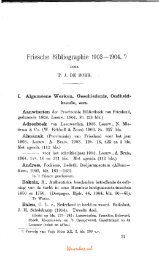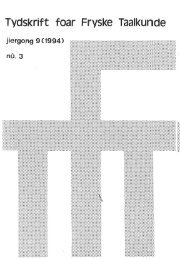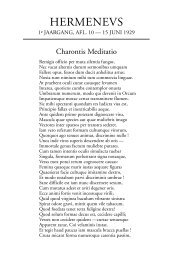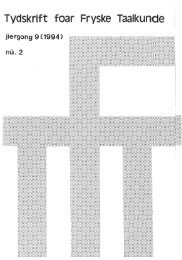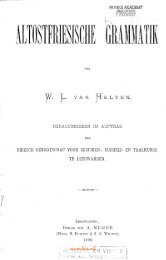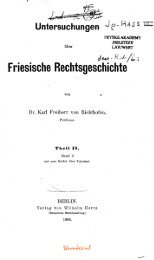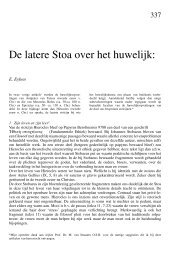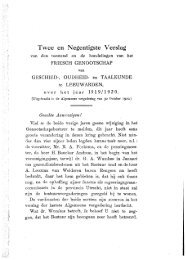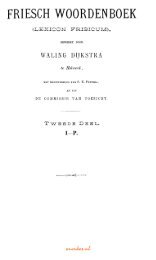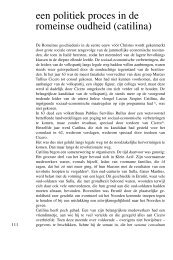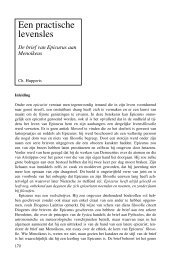It wurk fan Gysbert Japix n-2 - Tresoar
It wurk fan Gysbert Japix n-2 - Tresoar
It wurk fan Gysbert Japix n-2 - Tresoar
You also want an ePaper? Increase the reach of your titles
YUMPU automatically turns print PDFs into web optimized ePapers that Google loves.
established fact. The most important means of dating is presented by the years of appearance<br />
of the publications which served as models for GJ.<br />
4. Historical elements are distinguished through their exceptionality. Whether they<br />
are recognized depends on the degree of exceptionality.<br />
5. By Interpretation I mean an adequate explanation of the meaningof a textin as far<br />
as it can be deduced from the text itself. From the interpretation I exclude the investigation<br />
into the relations of the text to one or more models, to the author's life and<br />
opinions or to society, unless they are demonstrably present in the text.<br />
6. In explaining the genesis I distinguish occasion, dependency of models, anáfunctions.<br />
If the text itself does not contain an indication, one can often only guess at the<br />
occasion. As to dependency of other texts I am concerned with establishing in how<br />
far a text can be explained as the result of an adaptation of one or more texts. With<br />
respect to function I discuss the implicit relations in the text to the author's life and<br />
opinions and to society. The explicit references are treated in section 4 (Historical<br />
elements). In its relation to the author, a text can be either emulation or, more generally,<br />
evidence of literary craftsmanship, or, on the other hand, it can be an expression<br />
of either his personal circumstances or of his political, religious or cultural<br />
opinions. The question whether a text is a reflection of society (as an ideological and<br />
social superstratum dominating literature) draws attention to the demands of that<br />
society, but also to influences of which the author need not be conscious at all or<br />
barely conscious. By social demands I mean the need for literature or for literature of<br />
a particular kind. The need for literature in general, which applies to all literature, is<br />
not discussed here, but the need for literature of a particular kind knows its particularization<br />
with respect to subject, theme or choice for Frisian, for example, and that<br />
is why it is discussed here. Lmconscious influences are not considered here.<br />
Text by text (5.3)<br />
Title (l *lr)<br />
The title consists of a main title with a tripartite subdivision. The criteria for the<br />
subdivision seem to be love as a theme for part I, dialogues about practical subjects<br />
and occasional verse for part II, and psalms and hymns (mainly songs) on events in<br />
the life of Christ for part III. In it we recognize the triad of love, virtue and religion<br />
which Spies has demonstrated for sixteenth and seventeenth Century literature, but<br />
also perhaps the traditional division of literature after Vergil's Bucolics, Georgics and<br />
Aeneid. The main title fits the tradition of calling vernacular poetry after the language<br />
in which it has been written in distinction to (Neo-)Latin collections oîPoemata. Possibly,<br />
the text of the title page was not written before 1658. <strong>It</strong> was occasioned perhaps<br />
by the appearance of the anfhology Klioos Kraam (1656,1657), which included Dutch<br />
poetry of GJ's hand.<br />
d'Authôre to dy Lezzer (I *2r; I 278-279) and three epigrams (I *2v)<br />
The book begins with a pre face in the form of a letter. With respect to its contents, it<br />
is especially a defence against faultfmders. This also applies to two of the three epigrams<br />
which preceding the book proper follow the preface. Could Zoïlus and<br />
wumkes.nl<br />
515



